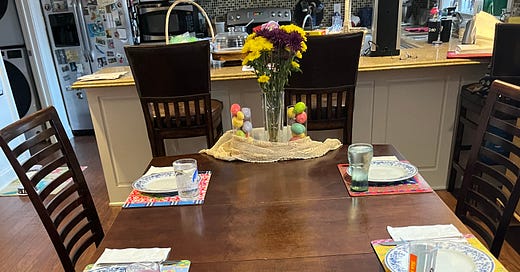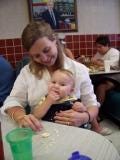One year ago this week I didn't lose my son and I am still so thankful
Four Plates: Reflections on Motherhood, the CBMW, and Almost Losing My Son
One year ago this week I didn’t lose my son. More than anything else, I am grateful for the family God has given me. I hope this post reminds you, as it does me, of everyday blessings.
Last night I asked my daughter to set the table. My husband and son weren’t home yet and my daughter and I needed to leave early for an event. Plates chinked as she pulled them from the shelf. I checked on dinner (Salisbury steak, green beans, and potatoes) before turning to get my shoes. My daughter had left for her bedroom, probably to put her shoes on too. I was short on time. Rushing to get done—until I turned and saw our dining room table. Then I just stopped.
Four plates sat there.
Four plates on four placements with four glasses of water.
Four plates waiting for the four members of my family.
Just two days earlier, on April 12, my 18-year-old son got in his car to drive to work. He was scheduled to teach a tennis lesson at 4 p.m. He didn’t make it to that lesson. His car veered on a bridge over the Brazos river, collided with an oncoming vehicle, flipped, and struck the guardrail before landing upside down. Eyewitnesses saw him tumble from what was left of the crushed vehicle. He looked dazed, they said, but stood up and ran to check on the other driver. The wreck had left him hanging upside down by his seat belt. His glasses broke and cut his face. Somehow he had the presence of mind to find his phone wedged under the seat. He kicked out the door and called 911. Then he ran to help the other driver. One of the witnesses told me she saw his Bible still in the front seat, a bookmark holding his place, as she watched him run across the bridge.
I can’t breathe when I think about what happened. I can’t breathe when I think about the fear he must have experienced at the moment of collision; when the airbag smashed into his chest; when the car rolled over and his head hit the window; when he found himself hanging upside down with no one there to help. I didn’t fall apart until after I had helped my husband and son gather up all the personal belongings. I made it about halfway back to where I had parked before emotion overwhelmed me.
I had almost lost my son.
But I didn’t. He walked away. So did the other driver. No one was hurt. It was a miracle. The four plates sitting on my table reflected that miracle.
Most of you know me as the author of The Making of Biblical Womanhood. You know the parts of my story I decided to tell. You’ve seen glimpses of my life, mostly what I have put out on social media.
What you don’t know is me as a mother. You don’t know that my son was born on my seventh wedding anniversary. You don’t know that I found out I was pregnant with him a few days after I submitted my dissertation for my PhD defense. You don’t know the hours I spent praying for him when I first began to suspect fertility problems. You didn’t hear the joy in my husband’s voice when I told him the news. You don’t know that I breastfed him for fourteen months; that I used to write lectures cradling him in my arms; that we spent months choosing his name; that I used to run everyday pushing him in a jog stroller with my fat dachshund riding in the basket underneath. You don’t know how my husband taught him to ride a bike by running alongside him, once even throwing his body in front to stop him on an overly steep hill (my husband looked pretty beat up when they came home that day). You don’t know that I read to him, almost every night of his life, well into his middle school years.
Indeed, you don’t know how much I laughed when the Council for Biblical Manhood and Womanhood accused me of being a bad mother, of advocating for child abandonment, simply because I told the story of St Paula in The Making of Biblical Womanhood. In their minds, my advocacy for women in ministry somehow diminished my capacity for motherly love. I can’t help but think about an observation made by Lisa Weaver Swartz in Stained Glass Ceilings. She writes that at the end of an interview with an “incredibly poised faculty member” at The Southern Baptist Theological Seminary in Louisville, Kentucky, the faculty member “learned that I was not only a gender scholar but also the mother of four young children. His composure melted for several awkward seconds as he scrambled to re-categorize me. Finally he exclaimed, ‘That’s glorious!’ His astonishment revealed the extent to which my embodiment of both feminism and maternal nurture challenged his assumptions.” Like me, Lisa Weaver Swartz experienced conservative evangelicals assuming her “feminism” as incompatible with “maternal nurture.”
It has been three days since my son walked away from that wreck. I can tell you beyond doubt that what the CBMW (or anyone else of their ilk) thinks of me as a mother doesn't matter. I know what my family means to me. I know I have children with strong faith. I know I have a son who, in the most traumatic moment of his young life, ran to help someone else.
I know that, by the grace and mercy of God, I have a miracle sitting on my dining room table: I have four plates, and that is enough.
Go hug your loved ones! Thanks for your patience—I am back to writing.






Man, who is cutting onions in my house at this hour?!? What a powerful, personal, message. Thank you for sharing it with us.
What a reminder not to allow the opinions of people who don’t know us— they might know OF us, but they don’t actually KNOW us— to have too much power in our lives.
Thank you for sharing your story. Very powerful. God gives us strength, doesn't He?
Blessings
Janis